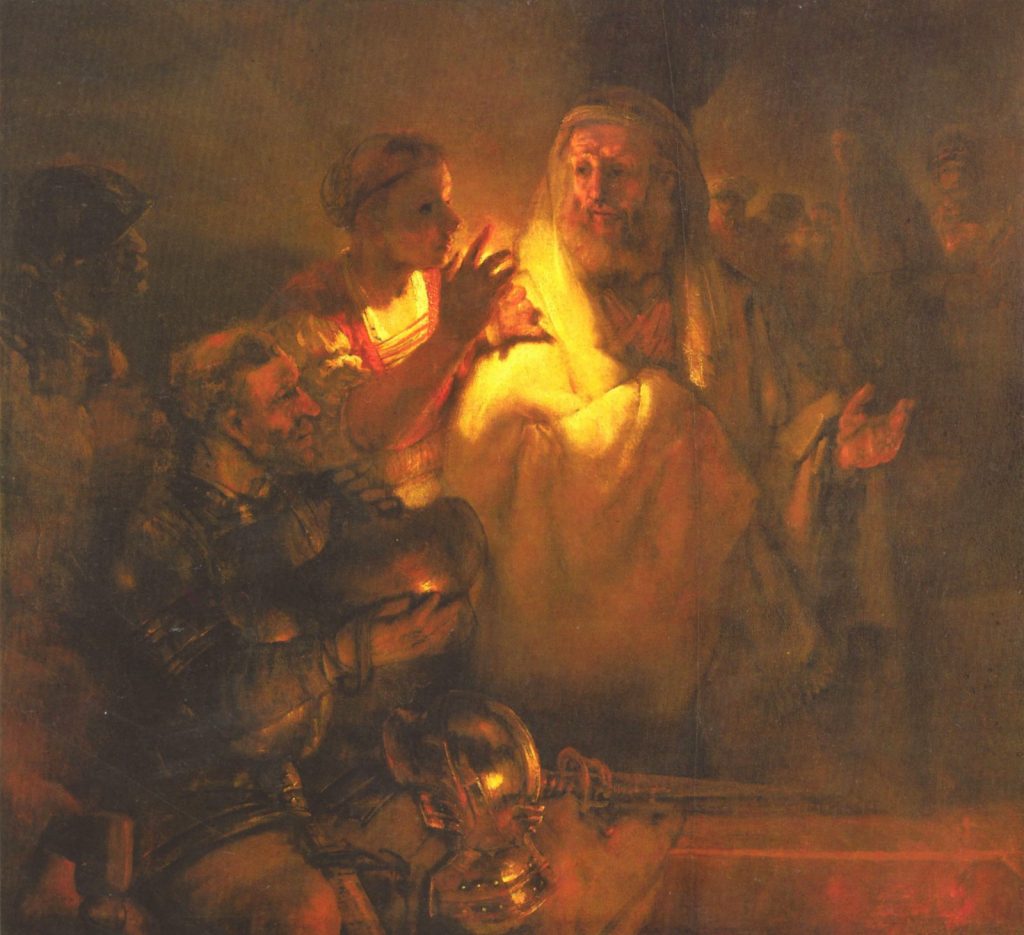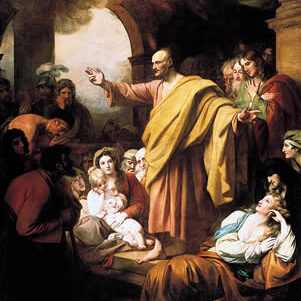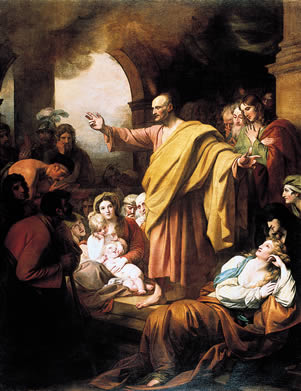- She kept the door at the palace of the high priest. After John followed Christ into the palace he spoke with her and asked if Peter could also be let in (John 18: 15-16).
- Peter joined a group of people who were warming themselves around a fire in the Palace;
- This damsel “earnestly looked upon” Peter and recognized him (Luke 22: 56);
- She asked him, “ Art not thou also one of this man’s disciples?” To which Peter replied, “ I am not.” (John 18: 17)
- All the accounts of her story are very similar but only in John is her statement to Peter phrased as a question. In all the other accounts she states to those around her that Peter is one of Christ’s followers. In Mark 14: 66 we read that, “there come one of the maids of the high priest; And when she saw Peter warming himself, she looked upon him and said, “And thou also wast with Jesus of Nazareth. But He denied saying I know not, neither understand I what thou sayest. And he went out into the porch; and the cock crew.”
The Maid
- After Peter denied Christ to the damsel and those standing around the fire he went out onto the porch of the Palace;
- Once on the porch “another maid saw him and said unto them that were there, This fellow was also with Jesus of Nazareth. And again he denied with an oath, I do not know the man.” (Matthew 26: 71-72)
- Mark 14: 69-70 recounts that, “ a maid saw him again, and began to say to them that stood by, This is one of them. And he denied it again.”
- After Peter denied Christ to her he was approached by a group of people, among them one of the kinsmen of Malchus (the man whose ear he cut off), who insisted that he was one of Christ’s followers “for thy speech bewrayeth thee” (Matt. 26: 73). Peter began “to curse and swear, saying, I know not the man. And immediately the cock crew. And Peter remembered the word of Jesus, which said unto him, Before the cock crow, thou shalt deny me thrice. And he went out and wept bitterly.” (Matthew 26: 74-75)
- The words “damsel” and “maid” are often used to describe young women. It is likely that these women were fairly young, probably teenagers or even younger;
- In the account given in John the gender of the person to whom Peter denies Christ the second time is not given. The account in Luke says that the second denial was given to a man. Yet the accounts in both Matthew and Mark state that “a maid” was the person to whom Peter denied Christ the second time. It is possible that the second denial might have been given to a man but I think that since two accounts state that it was a woman, and another doesn’t specify, that it is pretty safe to assume it was a woman.
My Thoughts:It is interesting to me that, by the way in which John spoke with the first damsel who kept the door at the palace, it seemed like she was acquainted with him. Later she asked Peter “Art not thou also one of this man’s disciples” indicating that she already knew that John was one of Christ’s disciples. It is possible that this damsel may have listened to Jesus preach or was even numbered among his disciples– perhaps openly or secretly. Seeing as she recognized Peter and obviously knew who he was and what his association was with Christ I can only imagine her reaction at hearing him deny his identity and refuse to be associated with Jesus. If she had been a follower of Christ how would her faith be shaken when the senior apostle denied Him, publicly and adamantly three times? Was she able to see past Peter’s humanness and his weakness and continues in her faith? If she was not a believer then I can only think how much more it must have cemented in her mind Christ’s fraud– if at the first sign of trouble the most valiant of His believers refused to stand by him. I don’t think she would have hesitated to share the fact that Peter (who would later leader the Christian church) once flat out lied to her about who he was and denied Christ. We have no way of knowing what this young damsel, or to the other maid, believed or what their reactions were to Peter’s denial. Yet we do know that they really only had two choices; they could have condemned Peter for his human weakness and mistake and used it to justify their opposition to the Christian church or they could have been able to see past Peter’s weakness and forgive him, like Christ did. In John 21, after Christ’s resurrection, we read about how Christ asked Peter three times “Lovest thou me” giving him the opportunity to redeem himself my repeating three times “ Yea, Lord; thou knowest that I love thee.” Even though Peter had denied Him and left Him alone at the time of his greatest need Christ knew Peter’s heart. He knew that he was a good man, that he was trying his hardest to do what was right, but that he was a man and that he had weaknesses and faults to overcome. Christ did not condemn Peter for his faults but rather loved him through them and gave him the chance to redeem himself. I think this story is a good reminder to us that all of us are human and that we all make mistakes. We will each face trials in our lives that will stretch us and try us and like Peter and we might not always handle those trials the right way. Yet we can always know that Christ looks on the heart and if we are sincerely penitent He will forgives us and overlook our mistakes— even if they are pretty big ones. On the other hand each one of us will be in the same situation as the damsel and the maid were. We will be faced with the glaring fact that those we love, those we respect, and those we sustain or follow have weaknesses and make mistakes– perhaps even mistakes that will shake our faith in them or in our testimonies of the gospel. Yet just like these two women we have two choices in how we react. We can judge, condemn, justify and walk away from the truth because of the mistakes of one man; or we can be like Christ and learn to forgive, love, and understand the weaknesses of those who have hurt us, denied us, and betrayed us. If Peter, who denied and abandoned Christ, could be forgiven and later entrusted to lead Christ mortal church then there is no one who has made mistakes so bad that they can’t be forgiven. It is not our place to judge or to condemn… only to love. “Peter’s Deial of Christ” by Rembrandt Questions to Think About:
“Peter’s Deial of Christ” by Rembrandt Questions to Think About:
- How do we “deny” Christ? Are we, like Peter, afraid to declare who we are and what we believe at all times and in all places because we are afraid of what those around us might say or do to us? Are we only willing to follow Christ when it is easy or will we follow Him even when we in “enemy” territory like Peter was?
- How would you react if you heard the senior apostle of the church deny his association to Jesus Christ? Would you still be firm enough in your testimony to follow Christ and his church? Is your testimony of Christ rooted in Christ or on a mortal man or woman?
- Do you know someone whose testimony of Christ has been shaken or hurt because they were offended by the actions of someone else? What was the outcome of the way they chose to react to it? How might things have been different if they had chosen to react differently?
- If you could write the end to these two women’s stories how do you think they would turn out? What sort of women would they grow up to be?





I had never thought before to connect Peter's betrayal x3 to the repeated question of "lovest thou me" x3 and as an opportunity for repentance. I really like that. (I never really understood before why Christ asked the same thing three times!
I also like the way you consider what these women's (and other onlookers') reactions may have been. It is so sad to see how many members' testimonies crumble when they see others make mistakes. :-/ We are to lean not onto the arm of flesh!
i've also read, though, that when jesus tells him he will deny him, that it is a commandment rather than a prophesy so that there will be someone to lead the church after jesus is gone. otherwise, they would have killed peter too. that put a whole new light on that situation for me and i don't think personally that peter enjoyed doing that. i think he denied christ because he was commanded to.
There's further discussion about whether it was a commandment or a prophesy here: http://troygparker.wordpress.com/2011/03/16/peters-denial-prediction-or-command/. This blog references a talk by Pres. Kimball, where he suggests Peter was following a commandment given to him by Christ, not betraying his Savior.
Aly and Jill W, those are fascinating thoughts that perhaps Christ commanded Peter to deny him. Very interesting! I'll have to ponder on that for awhile. Yet still, no matter if Peter was commanded to deny Him or not He still denied Christ to these young women and it must have affected them some way– for good or bad. It just reinforces my belief that we really can't be the judges of other people– we never know what commandments the Lord has given.
My thoughts on this post are here: http://danandkimberlytaylor.blogspot.com/2011/05/denial-tarnished-testimoney-and-being.html
A bit long for a comment!
These are great thought questions, and are great regardless of whether Peter's action was in obedience or in fear.
I would hope that if they were true followers, they would base their faith in the Savior and not in fallen people per se.
I would hope that they also would have given things time and then seen how Peter ended up truly being a rock.
Compassion in the face of others' alleged weakness (again, the commandment vs. fear idea could underscore that sometimes we just don't know, we can't judge on the outside) is a true trait of followers of Christ, I think.